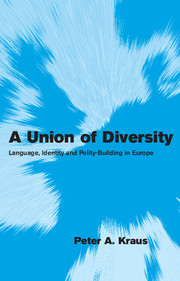Book contents
- Frontmatter
- Contents
- List of Tables and Figure
- Preface
- Acknowledgments
- A Union of Diversity
- 1 Introduction: The dynamics of European integration
- 2 The European Union's democratic deficit and the search for a European demos
- 3 The identity of a multinational polity
- 4 Language and politics: A challenge for Europe
- 5 The language question in the institutional complex of the European Union
- 6 Political communication in the transnational civil society
- 7 Recognition, self-determination and integration in a union of diversity
- References
- Index
- Titles in the series
Preface
Published online by Cambridge University Press: 22 September 2009
- Frontmatter
- Contents
- List of Tables and Figure
- Preface
- Acknowledgments
- A Union of Diversity
- 1 Introduction: The dynamics of European integration
- 2 The European Union's democratic deficit and the search for a European demos
- 3 The identity of a multinational polity
- 4 Language and politics: A challenge for Europe
- 5 The language question in the institutional complex of the European Union
- 6 Political communication in the transnational civil society
- 7 Recognition, self-determination and integration in a union of diversity
- References
- Index
- Titles in the series
Summary
Language politics and language policies played a crucial role in the historical processes of nation-state formation. Cultural and political integration in modern societies is largely based upon language. Thus, the making of nation-states went hand in hand with political attempts to introduce and maintain standardized communication codes. At later stages of political development, language policy was frequently associated with the goal of establishing a comprehensive and democratic public sphere. In multilingual settings, however, the political definition of a common language regime often became a matter of conflict. These general observations hold particularly true in the context of European history. It is in Europe where the idea of the national language originated and where it became inextricably connected with the dynamics of nation- and state-building. All over Europe, the forging of modern political identities entailed introducing communicative practices based on shared linguistic standards.
Against this background, it is quite obvious that the language issue bears extraordinary relevance if we want to assess to what extent the former logic of political integration has undergone substantial changes. We are experiencing the emergence of ‘postnational’ patterns of identification, which will ultimately reduce the salience of our ‘national’ attachments. The European Union has often been characterized as a regional harbinger of a coming global age of postnationalism. Accordingly, analyzing the role of language in the process of building Europe should improve our knowledge on the actual scope of the transition from ‘national’ to ‘postnational’ forms of political association in this part of the world.
- Type
- Chapter
- Information
- A Union of DiversityLanguage, Identity and Polity-Building in Europe, pp. xi - xiiPublisher: Cambridge University PressPrint publication year: 2008

